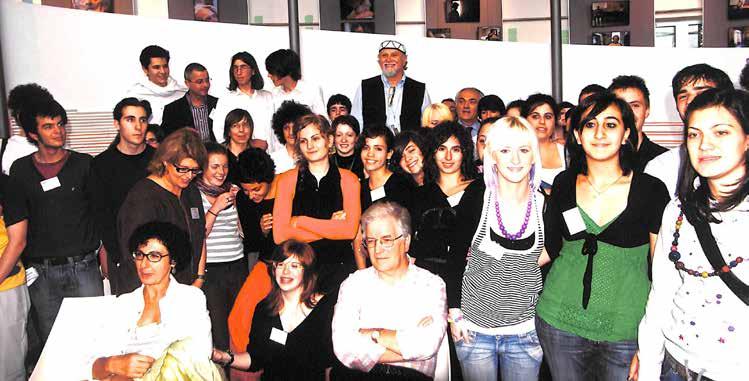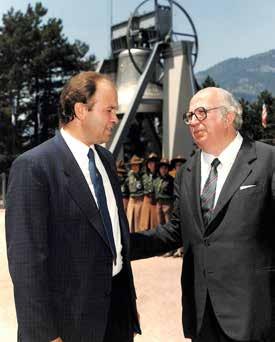The sound of Peace
As has been the case for some years now, on 9 May our Foundation celebrated Europe Day with a public ceremony with strong student participation, enriched on this particular occasion by an unprecedented video link with Kufstein, the city in the Austrian Tyrol with which Rovereto is united by a consolidated twinning relationship.
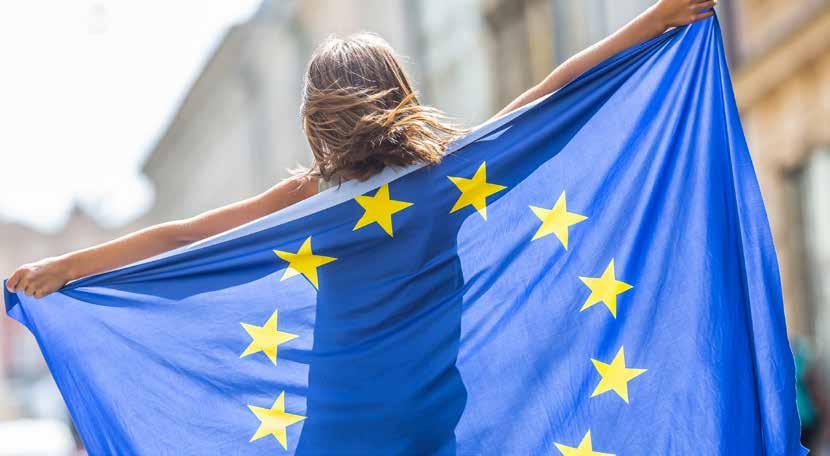
What follows is the speech I gave at the opening of the event.
«A very cordial good morning to all of you, both in Kufstein and in Rovereto, and a heartfelt thanks to the two institutions that made today’s connection across the Alps possible, the Municipality of Kufstein with the Bürgermeister
I would like to recall here, even if it is a well-known fact, that the two cities have been united since 1998 by a dynamic twinning relationship which is enriched today by a new and significant event.
I would also like to thank the other authorities present, in particular the members of the Rovereto City Council and above all Professor Michele Nicoletti, professor at the University of Trento, former parliamentarian and former president of the Parliamentary Assembly of the Council of Europe.
To be continued on page 6...
HAPPENING AT THE UN
Once upon a time
A FAIRY TALE FOR WORLD DAY FOR CULTURAL DIVERSITY FOR DIALOGUE AND DEVELOPMENT
On the occasion of the United Nations World Day for Cultural Diversity for Dialogue and Development, which is celebrated every 21 May, we propose a story by Agnese Bizzarri, writer of books for young children and active in educational and cultural projects at foundations, institutions, public administrations, universities and non-profit associations. The hope is that our readers will find time to read it to their children, perhaps at bedtime.
By the sea some friends gathered from different parts of the world, with different cultures, religions and ways of life. They needed to solve a problem: one of them had left because he was not heard during an argument. He didn’t want to be right, nor to dominate the others, on the contrary he wanted to talk and share ideas but unfortunately an unexpected quarrel had broken out.
So, they tried to work out why. They questioned the Sun, who said that the argument had been too hot and blazing, the waters needed to calm.
At that point they asked the sea, which with its wisdom, replied that a storm of verbs, adjectives and nouns had arrived and therefore nothing was understood anymore but only sound and non-constructive waves, flawed accents, commas and missing spaces.
To get another opinion they spoke to a heron. With his elegance he said that words travel and if they take the wrong direction they are never recovered and the conversation is gone.
Then they asked the girls and boys questions. They were so inquisitive and eager to listen. With their eyes and their smiles, they said nothing but had in fact understood everything.

A conclusion was soon reached: to communicate it was necessary to dialogue. Dialogue is a word made up of “dia” which means through, and “logos”, which means discourse. A dialogue is something that gets through. If this is missing, every word and concept will go on a tangent and no one will be able to speak, write or express themselves. The “dia” in dialogue says it all! It is a line that crosses hearts, peoples, religions, beliefs and languages in their diversity and in the beauty and richness of their complementarity.
The friends recovered their companion in their adventure. They began to talk, to chat without aggressiveness, without any threat, friction, rancour or judgement respecting the differences that made the dialogue fascinating and interesting. And in the dialogue, they all began to build thoughts and games together. They planned trips, invented new words, exchanged ideas. With the dialogue appeared a wave of creativity and therefore of life and transformation.
In that “dia” there is a universe, in “through” there is the whole world.
Artificial intelligence against paedophilia

The phenomenon is constantly growing and simply overwhelms the response capabilities of law enforcement agencies. Tens of thousands of crimes are committed online every year, linked to paedophilia or child pornography. There is no way to report them all, to track them, to avoid them. We must prevent them. This is according to the experts: the imbalance between the number of people looking for victims and the number of agents trying to hinder them cannot be “humanly” filled. We must therefore go beyond the human, and this is now possible thanks to artificial intelligence (AI).
ChatGPT, Bard, and the myriad of related features already exist. More are soon to come. Fighting them is useless, we have already had the experience of Luddism and we know how it ends. What you can do is use things, regulate them and try to make the best of them. Then there will always be someone who abuses it, but this also happens for bread knives, hoes, pens, cars, computers or antidepressants. And so, precisely to make the best use of what we have available, the European Union has financed the development of an application, Salus, which thanks to AI should be able, once developed, to identify child pornography images and videos, blocking them in real time. As always, there is a need to train the system to recognize violent content, but the process is already underway. One hundred and eighty users are testing the app in five countries: Germany, the Netherlands, Belgium, the Republic of Ireland and the United Kingdom. The process will last several months.
But to understand exactly what people attracted to child pornography are looking for online, you need to know them well, scientifically define their tendencies, study the phenomenon in depth, perhaps for years, or ask them directly. And it is this path that has been chosen. The project foresees a second phase in which volunteers will be involved who have searched for child pornography on the web in the past. These people will be chosen by associations, such as the Lucy Faithfull Foundation, which organize initiatives of assistance for paedophiles who wish to abandon that world. Among them there may also be individuals convicted of child abuse who have embarked on a journey of recovery.
Donald Findlater, one of the experts leading the program, explained that tools such as the new App represent «a practical aid for people who recognize a vulnerability in themselves» and wish to overcome it. Furthermore, those who have already found child pornography online are certainly more capable than others of finding flaws in artificial intelligence and of carrying out accurate tests to prevent free zones from remaining on the deep web where the sexual commodification of minors can continue.
Two birds with one stone: fighting paedophilia and helping those who wish to free themselves from that condition. Artificial intelligence is a very powerful tool, but like all others it depends on the use that man is able to make of it. We shall have to get used to it.
HAPPENING AT THE COUNCIL OF EUROPE
Democrazia at risk
THE 4TH SUMMIT OF HEADS OF STATE AND GOVERNMENT IN REYKJAVIK
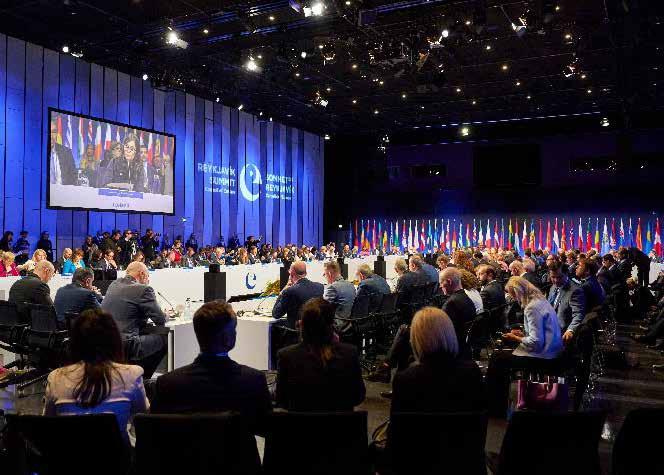
The Russian aggression against Ukraine is being dealt with «by elevating Europe and guaranteeing the peace and democratic security that comes when the rights of every person are respected. This meeting offers you the opportunity to do just that… And not only in word but in deed». Speaking at the opening session of the 4th Summit of Heads of State and Government of the Council of Eu -
rope, which took place in Reykjavik in May, Secretary General Marija Pejčinović Burić was very clear in asking European leaders to take urgent measures to reverse a process that might actually lead to the decline of democracy.
Europe is faced with an important choice, she stressed, «we can allow our directives to break down and see Europe regress uncontrollably. Or, we can reinvest in
what has done good for so many people over the last seventy years… This is a chance for you to set a solid and lasting path for the Council of Europe». The Secretary General encouraged the summit participants to promote the Reykjavik Principles of Democracy and strongly support the accession of the European Union to the European Convention on Human Rights. The Council of Europe’s «timeless standards», she stressed, must be applied to contemporary challenges, such as artificial intelligence and climate change.
The appeal did not fall on deaf ears. The heads of state and government of the organization’s 46 member states have agreed to establish a register of damage caused by Russia’s war of aggression as a first step towards an international compensation me -
chanism. Leaders also agreed on the need to strengthen the Council of Europe and its action in the fields of human rights, democracy and the rule of law by adopting a declaration on democratic principles, renewing their commitment to the European Convention on Human Rights and developing tools to respond to emerging technological and environmental challenges.
In accepting the invitation to act immediately, the leaders of the Council of Europe adopted the «Reykjavik Principles for Democracy», a series of guidelines to be respected in different areas, including freedom of expression, association and peaceful assembly, the independence of institutions, the impartiality and effectiveness of the judiciary, the fight against corruption and the democratic participation of civil society and young people.
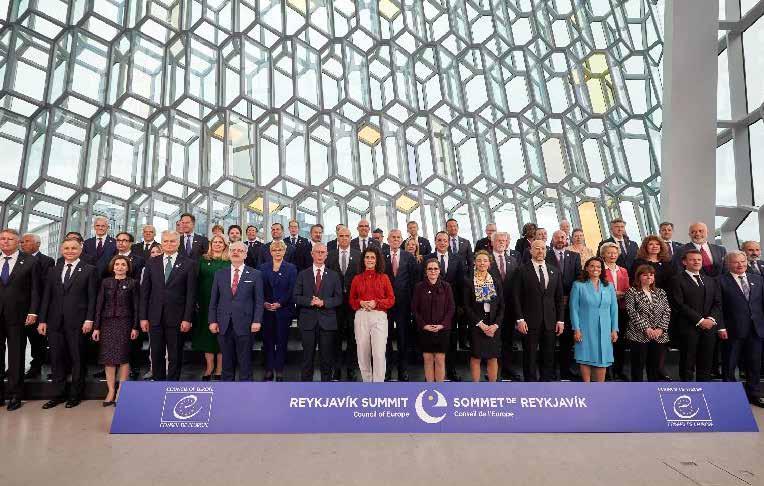
In essence, it is a question of working towards full application of the Convention, which on paper is considered by all to be a cornerstone of the protection of human rights, but in practice is not uniformly respected. Furthermore, we cannot forget that these principles must be applied in concrete areas, to which they are profoundly linked. Among
these, the environment is perhaps the first according to the experts, since a clean, healthy and sustainable environment is essential for the full exercise of human rights. The work of the Council of Europe in this area must therefore be based on the political recognition of the right to a healthy and sustainable environment, also relying on the ample jurisprudence advanced by the European Court of Human Rights.
But the challenges to be faced are multiplying and for this reason the summit has defined a series of other priorities that must characterize the activity of the Council of Europe. Topping the list is the accession of the European Union to the European Convention on Human Rights, but new rules also need to be implemented to protect human rights in the digital age both online and offline, particularly in the field of artificial intelligence, as well as the promotion of social rights in Europe through the Social Charter. There are other specific cases, in particular that of Belarus, for which continuous cooperation has been established with the forces of the democratic opposition, as well as with human rights defenders, free media and independent civil society.
To be continued from page 1..
His long-awaited speech will conclude the official part of our event.
I then extend an affectionate welcome to Annamaria Megalizzi, mother of Antonio, the brilliant young journalist from Trentino, an enthusiastic supporter and promoter of European ideals, who fell victim to a criminal episode of terrorism in Strasbourg at the end of 2018.
Lastly, I would like to mention the presence of a large group of students, engaged with their teachers in a day of study on the issues of today’s Europe, at Colle di Miravalle. They have come from as many as 6 countries (Austria, Bosnia-Herzegovina, France, Germany, Ireland, Spain) and within a few hours of getting to know each other already appeared perfectly integrated with their Italian peers.
Moving on to the meaning behind the celebration, today we are commemorating Europe’s 73rd birthday, the so-called «Schuman Day», named after the then French Forei-
gn Minister, Robert Schuman, who precisely on 9 May 1950 announced his initiative for the creation of a common space on our continent. A project formed by a process in various stages and increasing levels of integration, marked by many successes and some inevitable disappointments, which paved the way for the current European Union, with its 27 member states and 450 million inhabitants. An entity that from its creation to the present day has guaranteed its members peace, freedom, prosperity and high standards of democracy. Fundamental values that each of us should uphold but above all, not take for granted, based on the dramatic feedback provided by the media in relation to various territories, also those that are close to us.
Consequently, I consider it essential to celebrate the date of May 9 as European citizens, aware of our rights but also of our duties and making our own the message of two world-known symbols of peace, that is the Heldenorgel of Kufstein and the Rovereto Peace Bell.
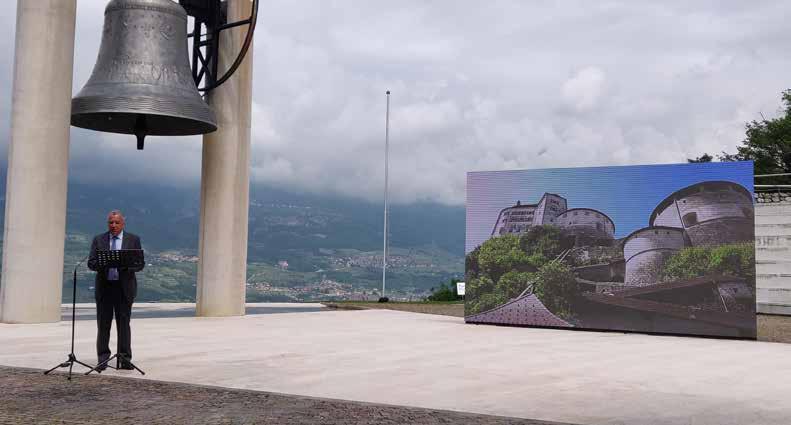
Despite their diversity in appearance and sound, the vibrant universal call conveyed by both is identical, namely the need for states to base their relations on mutual respect and understanding. In fact, in the case of problems, dialogue and negotiations, and certainly not the use of force, must be the main ways to face the difficulties and resolve them with shared satisfaction».
So far, we have the commemoration at Colle di Miravalle, which coincided with two events of undoubted relevance in a wider European context. On 4 May, the foreign ministers of 9 member countries (forming a «Group of Friends», with the support of France, Germany, Italy and Spain among others) launched an unprecedented initiative, through a joint declaration, to reform the voting system within the EU, proposing to abandon the unanimity rule also for the crucial sector of foreign and security policy and to introduce the qualified majority rule.
From Strasbourg, the German Chancellor Scholz went even further in aid of Europe Day by including the sensitive tax matter in the auspicious new voting system.
Commenting on the aforementioned, it seems realistic to note that there is still a long way to go (the qualified majority requires the vote of 15 states representing 65 per cent of the EU population), also due to the obvious opposition of some (with Hungary and Poland predictably among those at the top of the list) to the abandonment of the “golden rule” of unanimity. On the other hand, it is now evidentas demonstrated beyond any possible doubt by the criminal Russian aggression of Ukraine - that within the current context of inter-state relations, Europe’s maintenance of an adequate role in its history and its potential needs to transpire through the strengthening of its supra-national cohesion and the speeding up of internal decision-making processes.
Under the current system, these two objectives are not without constraints and all too often end up falling hostage to the “blackmail” of this or that member country, with purely nationalistic motivations.
Considering that, with the delays, uncertainties and reticence of the case, a top-down movement in favour of the need for “more Europe” seems to be envisaged at an institutional level, it is now certainly desirable to intensify a similar bottom-up phenomenon at the level of resident populations and civil societies. In short, a “pincer” operation, for once not associated with military manoeuvres for the conquest of territories or the destruction of infrastructures, but aimed at obtaining higher levels of democracy, freedom, respect for human rights and social solidarity. In the much smaller geographical context to which Rovereto and Kufstein belong, the initiative of 9 May aspires precisely to these objectives.
It is certainly not with a light heart that I conclude this editorial by mentioning the very recent visit to the vast flooded areas of Emilia-Romagna made by the president of the EU Commission, Ursula von der Leyen, in the company of Prime Minister Meloni also with the aim of evaluating the most appropriate forms of assistance that might be provided by the Brussels institutions.
«Europe is with you» the head of the Commission declared at the end of her visit with a sentence that lends itself to various interpretations, from a superficial involvement to effective solidarity. Faced with the immense extent of the devastation and the extraordinary reaction of the affected populations, who immediately set to work to restore “normal” conditions, I have no reason to doubt that the second hypothesis is the correct one
Reggente Marco Marsilli, Foundation President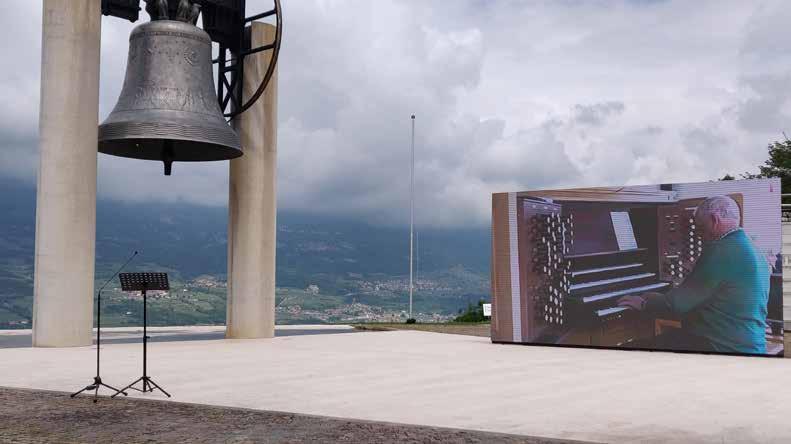
Spadolini at the Foundation
